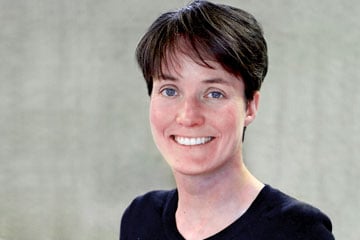
The Alberta Law Reform Institute will make final recommendations next week to amend the Alberta Evidence Act in order to better facilitate the giving of evidence by children and other witnesses whose competence to testify may be in doubt.

The Alberta Law Reform Institute will make final recommendations next week to amend the Alberta Evidence Act in order to better facilitate the giving of evidence by children and other witnesses whose competence to testify may be in doubt.
“One of our goals was to bring the Alberta Evidence Act into line with the Canada Evidence Act,” says Laura Buckingham, who is legal counsel for the Alberta Law Reform Institute at the University of Alberta.
The Institute argues that the Alberta Evidence Act is out of step with the federal legislation, which applies to criminal proceedings and other matters within federal jurisdiction. In its report to be published on Feb. 7, ”Competence and Communication in the Alberta Evidence Act: Final Report 111,” the Institute will recommend reforms to the Act that would:
• facilitate the reception of relevant evidence by child witnesses, adults with cognitive impairment, and witnesses who use alternative forms of communication;
• avoid arbitrary distinctions based on age, religious belief, or other personal characteristics;
• provide flexibility to accommodate individual’s particular abilities or needs; and
• align practices for determining witness competence under the Alberta Evidence Act and the Canada Evidence Act.
Alberta law, for example, still requires a judge to investigate a person’s religious beliefs if there is any question as to whether a witness is competent to give evidence under oath.
“Right now, in order to determine whether a child will be allowed to give evidence, the court has to determine whether they understand the nature of an oath,” Buckingham notes. (A similar test applies if an adult’s competence is challenged.)
But an oath is based on a religious concept such as a belief in God, says Buckingham, and so before the child can give evidence she may be questioned on her religious beliefs. This can be a sophisticated subject for a youngster to contemplate, and not necessarily appropriate to giving reliable evidence; and if a child doesn’t understand the nature of the oath, the court will need to determine if they understand what is meant by the truth, she says.
Children can be allowed to give evidence whether or not they swear an oath, but the courts will not give it the same weight as evidence given under oath, as a child’s unsworn evidence cannot be relied on unless it is corroborated. The Institute charges that the requirement for corroboration is out of step with the law of evidence in other Canadian jurisdictions and with “current knowledge” about children. “We’re proposing to disengage [the taking of an] oath with whether they are capable to give evidence,” Buckingham says.
The Institute will propose that competence to give evidence would be based on an ability to communicate; “whether a person would take an oath or affirmation would be dealt with as a separate question,” she says.
Under Alberta legislation, a witness may make an affirmation and declaration if they object to taking an oath, or are objected to as incompetent to take an oath, and the judge is satisfied of this. Federal legislation is less restrictively worded, indicating that a witness may make a solemn affirmation if that witness “does not wish to take an oath.”
In consulting with the Alberta Bar Association, the Institute’s report notes many respondents were concerned that evidence should be reliable. Although there is no way to guarantee that all evidence presented to triers of fact will be reliable, there are strategies at different levels to filter out unreliable evidence and promote the use of reliable evidence, the Institute’s report notes.
In an article published in early January on child witnesses in criminal courts, Queen’s University law professor Nicholas Bala listed a number of questioning techniques to “increase the accuracy and completeness of the testimony of children,” including mimicking the vocabulary of the child, confirming meanings of words with children, and avoiding abstract conceptual questions.
Broadly speaking, the Institute’s proposals are consistent with federal legislation under the Canada Evidence Act as it has been amended, says Buckingham.
For example, the Canada Evidence Act permits courts to allow witnesses with physical or mental disabilities that may prevent them from communicating readily “to give evidence by any means that enables the evidence to be intelligible.” On the other hand, a section of the Alberta Evidence Act regarding the evidence of a witness who can’t orally communicate “very narrowly applies to people who can’t speak at all,” she says.
The Institute will propose that people who may be able to speak, but have difficulty doing so, would be better served giving evidence in another way; Buckingham notes a case from Saskatchewan in which a witness who had a severe stutter was judged by the court to be “better served give evidence in writing.”